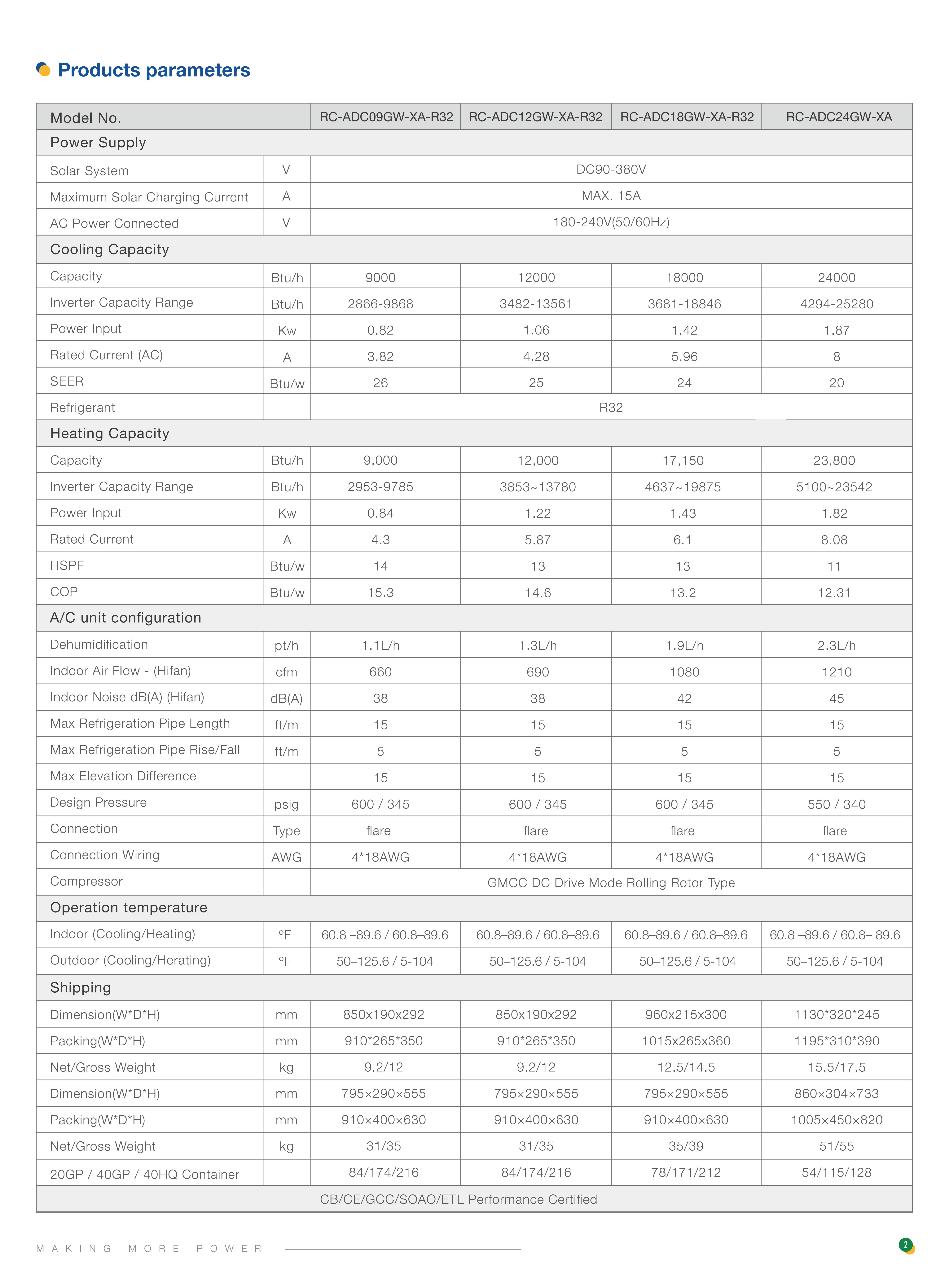It's worth mentioning that the effectiveness of a solar air conditioner depends on factors such as the location's solar potential, system design, insulation of the building, and energy consumption patterns. Consulting with a professional installer or provider is recommended to determine the suitability and performance of a solar air conditioning system for your specific needs.
Solar panel voltage:
DC90-380VMaximum Solar Charging Current:
15AAC Power Connected:
180-240V(50/60Hz)Refrigerant:
R32Compressor:
GMCC DC Drive Mode Rolling Rotor TypeConnection:
Flare
A solar air conditioning system, also known as a photovoltaic (PV) solar powered air conditioner, utilizes solar energy to power the cooling process. Here are some advantages of using a solar air conditioner:
Energy Efficiency: Solar air conditioners are highly energy-efficient compared to traditional air conditioning systems. They convert solar energy directly into electricity, avoiding the need for grid power or fuel consumption. This can lead to significant energy savings and lower utility bills.
Renewable Source: Solar energy is a renewable and abundant resource. By utilizing solar power for air conditioning, you reduce reliance on non-renewable energy sources and contribute to a cleaner and greener environment. It helps to reduce carbon emissions and combat climate change.
Cost Savings: Once installed, solar air conditioning systems can help reduce or eliminate electricity costs for cooling. Though the initial installation cost may be higher than traditional AC units, the long-term savings on energy bills can make up for it over time. Additionally, some countries offer financial incentives, such as tax credits or rebates, for installing solar systems.
Off-Grid Capability: Solar air conditioners can operate independently of the main power grid, making them suitable for remote areas or locations with unreliable electricity supply. During sunny days, solar panels generate electricity to power the air conditioner, allowing for uninterrupted cooling even in off-grid situations.
Quiet and Environmentally Friendly: Solar air conditioners generally have quieter operation compared to conventional air conditioning units. They also produce less noise pollution since they don't rely on noisy compressors or generators. Moreover, they have a smaller carbon footprint, as they reduce reliance on fossil fuels and contribute to cleaner air and a healthier environment.
Long Lifespan: Solar air conditioning systems typically have a longer lifespan than traditional AC units. Solar panels can last for several decades with proper maintenance, and the AC components can also benefit from reduced wear and tear due to energy-efficient operation.

There are several advantages to using a solar-powered air conditioner, particularly those powered by photovoltaic (PV) solar panels. Here some of the main benefits:
Energy savings: Solar air conditioners rely on renewable solar energy, which reduces or eliminates the need for grid electricity. This can result in significant energy cost savings over time, especially in regions with abundant sunlight.
Environmentally friendly: Solar air conditioners are much greener than conventional air conditioners that rely on fossil fuel-generated electricity. By harnessing solar power, they produce zero greenhouse gas emissions, making them environmentally friendly and helping combat climate change.
Energy independence: Solar air conditioners provide a degree of energy independence since they are not reliant on the power grid. This can be particularly advantageous in remote areas or during power outages, as long as there is sufficient sunlight to generate electricity.
Lower operating costs: Solar air conditioners can help reduce the operating costs of cooling systems, especially in areas with high electricity rates. Once the initial installation costs are recovered, the ongoing operational costs are minimal.
Long-term investment: Investing in a solar air conditioner can be seen as a long-term investment due to the potential for energy savings and the durability of solar panels. With proper maintenance, solar panels have a lifespan of 25 years or more, providing a reliable source of power for the air conditioning system.
Scalability: Solar air conditioning systems can be designed to suit different needs and sizes. They can be scaled up or down depending on the cooling requirements of a building or space. This flexibility makes them suitable for various applications, from residential homes to commercial buildings.

It's worth noting that the suitability and performance of solar air conditioners can depend on factors such as the availability of sunlight, the size and efficiency of the solar panels, and the cooling demands of the space. Consulting with a reputable solar installer can help you determine the best solution for your specific needs.
FAQs:
Q1: Do you support OEM/ODM?
A:Definitely, OEM&ODM service is supported with a certain quantity,including customize logo,package and label;
Q2: What's the production time?
A: The production time is normally 15 working days. but we will always prepare some stocks for popular models.
Q3: Can you provide DDP service?
A:Yes, if you are a personal customer and don't want to deal with the customs, we can provide DDP service to your address.
Q4: What about the warranty and how to claim?
A: Warranty period are 5 years since you receive the product, our professional after-sales team will deal with all warranty issues.